#and ultimately dropped
Explore tagged Tumblr posts
Text
my toxic trait is thinking that i can speak any language after hearing it in a show/movie once and googling shit like "how to learn italian"
#i took up 3 languages#made it past the beginner level#and ultimately dropped#lol#sometimes at school i assist kids in french/spanish and think i can figure it out in like a month if i just start studying#i sooo wanna learn another language tho like i wish i remembered how i even learned english to this degree#at least i wanna remember german i was p good at that#:(#mimi.txt
5 notes
·
View notes
Text
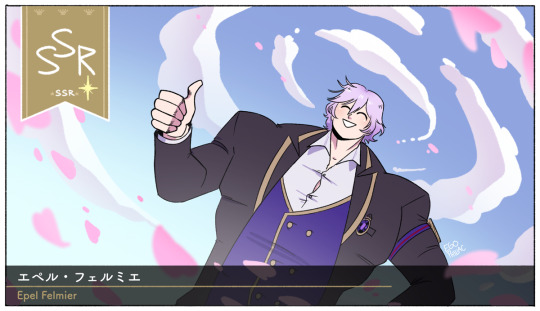
we were fucking ROBBED
#art#twisted wonderland#twisted wonderland spoilers#twisted wonderland episode 7 spoilers#twisted wonderland book 7 spoilers#twisted wonderland episode 7 part 8 spoilers#twisted wonderland book 7 part 8 spoilers#the only ssr i'll whale for#oh my god i loved this update. holy shit#got some ~compositions~ in mind so i'll get to the more serious stuff later#in the meantime those first couple of chapters genuinely made me question if i was perhaps trapped in my own absurd dream or not#the whole-ass video just DROPPED in there idia how long were you WORKING on that#don't forget to like and subscribe! :)#i demand that all cutscenes be animated in that style forevermore#i also demand that all clothing changes henceforth be done via magical girl transformation phrase#not just in the dreamworld. all of them.#DREAM~~~~~FORM~~~~~CHAAAA~~~~NGE#also savanarook was so unexpectedly precious! i want to protect him.#augh there's SO MUCH and i am SO PLEASED with all of it#anyway i guess we're going to be going through everyone's dreams after all!#and it's going to be a THING!!!!!!!! CLOSURE AND SELF-ACCEPTANCE FOR EVERYONE#(insert 'it's all coming together' meme)#man i hope 'please watch this video' remains a running gag it's AMAZING#also i cannot believe#i cannot BELIEVE#that the plan is actually literally#defeat malleus by inviting everyone else to the party except him#HIS ULTIMATE WEAKNESS#malleus doesn't get to be in smash bros
6K notes
·
View notes
Text
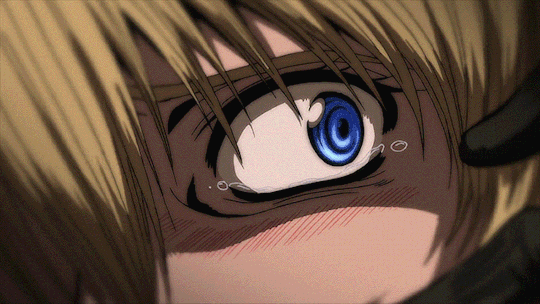

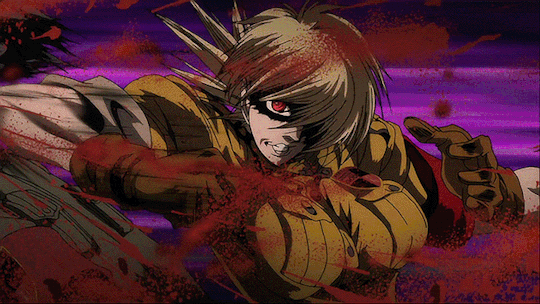
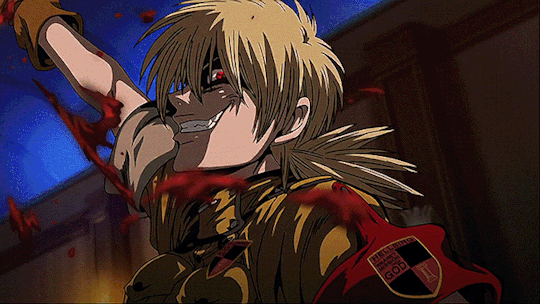
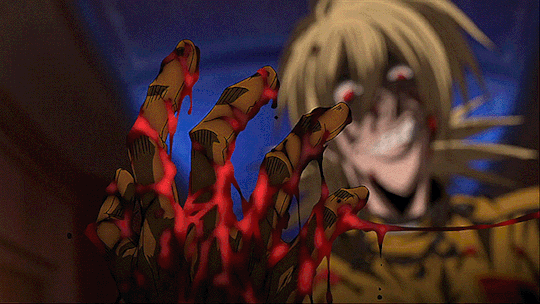
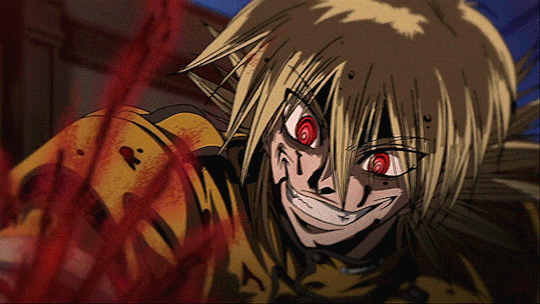
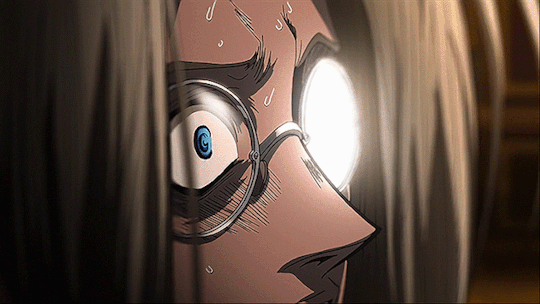
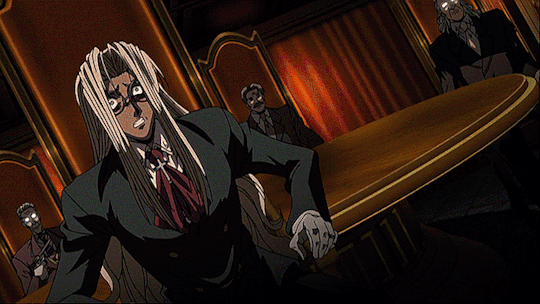
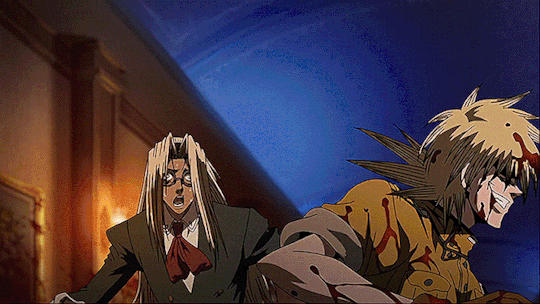
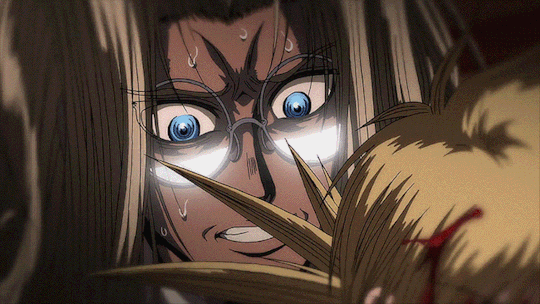
"Seras! You can stop now! That's enough!
Enough… Please… Stop…"
#hellsing#hellsing ultimate#gif set#seras victoria#integra hellsing#dropping the sertegra nuclear bomb after a year and a half. what's good everyone
1K notes
·
View notes
Text
Reading (listening to, as Homer intended) the Iliad making me go oh. Ohhh. I should have done this before I read Gideon the Ninth. I get it now.
Particularly thinking now about the tidbit that in early drafts, our beloved gray-eyed Necromancer Warden of the Sixth House was named Diomedes Sextus. For Diomedes, king of Argos, young, brave, noble, heroic. Favorite fighter of Athena, bestest friend of Odysseus. And, notably, fought gods and—well he didn’t win exactly. But he got them good.
And specifically, he fought and wounded Aphrodite; Aphrodite, who is also called Cytherea.
And then of course Tamsyn Muir said she decided to change his name so she could make the Sex Pal joke.
Palamedes is a less heroic, less fondly remembered character in the Trojan War, but according to Plato, he unrelatedly invented both number and the alphabet, so you keep that connection to scholarship even if that’s not the first association with him. More interestingly, imo, there’s also an Arthurian Knight of the Round Table named Palamedes, best known for his unrequited love for Isolde (and his apparent ultimately gracious acceptance of her choosing Tristan).
I think this is actually a super interesting shift in thematic naming focus: from favored-of-Athena, fought-gods-and-wounded-them to unrequited heterosexual love, but didn’t act like a dick about it.
Also y’know. Sex Pal
#I also wonder when this happened because there’s the shared ‘am’ sound in Camilla and Palamedes that Muir pointed out#That she was going for with her necromancer-cavalier pairs#Abigail and Magnus have an ag/ga element; Cainabeth Abella and Naberius all have ‘ab’ before they became Coronabeth and Ianthe#Which is super interesting itself. Coronabeth an Naberius retained that connection while Ianthe did not#Muir talks about how she was going for that naming theme then ultimately decoded to kinda drop it#But Palamades and Camilla get to share that syllable sound. Because they are on the same wavelength and they love each other#The Locked Tomb#Gideon the Ninth
3K notes
·
View notes
Text
Hindsight is 20/20, but I don't think you needed to be psychic to guess that destroying ALL the shimmer supply was a bad idea.

In Act Three it took three whole doctors to save Vi's life after she gets slashed by a Noxian blade across the chest. Yet in s1 it took a single drop of shimmer to save Vi from the deep stab in the gut Sevika gave her without any other form of medical intervention.

There's just a really gross sense of irony that Caitlyn and Piltover at large took away Zaun's main source of medical care (as controversial as it may be), and then put it's people through a meat grinder battle while withholding such care.
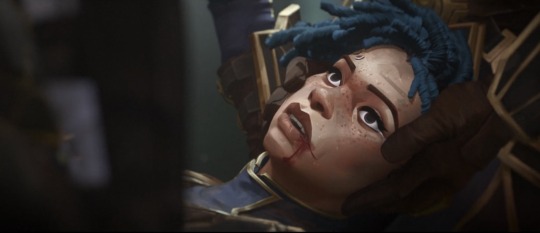
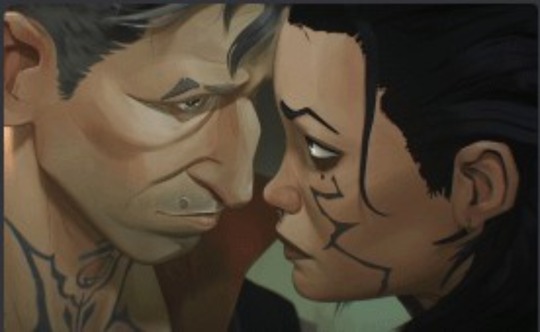
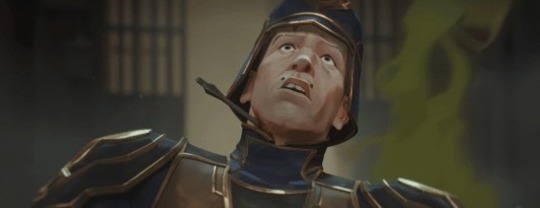
It doesn't help that the meat grinder battle was useless ploy for Jayce to get close to Viktor and so a lot of people, specifically Zaunites, died for nothing.
#arcane#caitlyn kiramman#vi arcane#gertie arcane#arcane meta#on one hand there's this completely unexplored aspect of arcane#where zaun is a place that actually has developed advance technology to deal with it's ailing population#while Piltover's side lagged behind bcuz they're culture has no real sense of urgency to care for the disabled and ill#Piltover's clean and healthy environment is already a large preventative measure for it's populace so they don't race to develop treatments#and cures#but just like the overall nature of the PnZ conflict in arcane it's inclusion in the show is outright shallow and ultimately dropped by s2#bcuz the writers aren't in fact interested in it#but oh well bcuz i am#that whole finale happened without any sense of shame remorse of self awareness from anyone on the piltovan side#and that wud be fine if ANYBODY else acknowledged including the writers#srsly the only zaunite necessary in that fight was ekko and that's it#everyone else was literally set dressing
568 notes
·
View notes
Text
Ideology of Exceptionalism and Gravity Falls; meta and character analysis

I had a whole ago read a post by @icanlife that had a quote by Alex Hirsch on Ford's greatest flaw, and wanted to explore what the flaw is, which is the ideology of exceptionalism; in the exploration, I’ll touch on what it is and how it is used in abusive relationships and cults, as well as how it drives multiple Gravity Falls characters and consequently how it impacts relationships between these characters, and how the show ultimately refutes exceptionalism.
Quick note here; I am not in any way, shape or form a psychologist nor have any formal training in psychology; this is written from my own experiences with this ideology and my own forays into psychology and trauma-informed learning. It is also written with a loose understanding that is likely not broad enough to cover all references to cults, extremist groups and abusive relationships.
The Ideology of Exceptionalism
First of all, we have to get through a drier bit, which is… what is the ideology of exceptionalism and how does it arise? Might be fairly obvious, but it is the belief that you are, or belong to, a group of exceptional people, thus more important and worth more than anyone else; ie, those who don't qualify as 'exceptional'. It is often a subconsciously learned ideology. Now, what qualifies one as exceptional can be extremely varied; generally it revolves around something that provides some form of privilege. Thus, it might be, as the main exceptionalist idea in Gravity Falls, 'intelligence', or power, or it can be such things as attractiveness, quantity of money one has, species, nationality, or skin colour and ancestral heritage. The ideology of exceptionalism, being by nature hierarchical, devalues, and at its worst, openly and violently dehumanizes those who do not qualify as exceptional.
For why exceptionalism occurs is an extremely broad topic, but I've personally found that, for exceptionalism revolving around intelligence, it's a result of a poor sense of self-worth, and having one's self-worth tied to what makes one exceptional. Poor self-worth itself (again, broadly) is a result of childhood trauma from a lack of positive affirmation and unfulfillment of the emotional needs of the child. Meanwhile, self-worth becoming tied to the quality of exceptionalism generally is a result of when positive affirmation was pretty much solely provided around their 'exceptionalism', especially when provided derogatory commentary, or a blatant example of how they would be treated if they aren't 'exceptional'. As a result of the general lack of affirmation, self-worth then becomes often solely reliant on the qualities of exceptionalism, as that is the only way for the child (and later, adult) to get affirmation of their worth, as well as out of fear of being ‘not worth anything’ like the examples of ‘non-exceptional’ people they have been given.
This is especially likely to occur when the child is a social outcast; the adoption of the hierarchical ideology of exceptionalism, and the devaluation/dehumanization of others often occurs subconsciously as an avoidance/minimization tactic from pain. This is to say, the child, and later the adult (if healthy self-worth is not established) goes 'it doesn't matter what the non-exceptional people say or if they accept me since I matter more than them because of my exceptionality'. It can even be taken further, that being shunned is part of one's exceptionalism, and becomes part of the qualifier of being exceptional. For instance, 'they just can't understand because they aren't exceptional and that's just a part of being exceptional'. This idea also neatly tailors into the part of the concept of being better then others means you are separate from others; this can be taken that someone who is special, needs to be alone to be truly special.
Obviously, exceptionalism is not a healthy coping mechanism for poor self-worth, as often such people constantly feel the need to prove and show off their exceptionalism to gain that affirmation and avoid rejection, which is stressful. As well, it often negatively impacts their relationships with other people as a result of the arrogance of believing that they are better than most others, or even deliberate sabotage due to their arrogance. This occurs as they flatten the complexity of human experience to black-and-white hierarchical categories of exceptional/not-exceptional through constant judgement of those they meet, and often refuse to engage with people who don't belong to their 'exceptionality', or even people they simply don't like, even if they technically qualify. Generally, those that they do like or have close relationships with, often due to being similar, are automatically labelled as 'exceptional'. Those judged as ‘exceptional’ also become privy to the open judgements of ‘non-exceptional’ others, out of a subconscious belief by the exceptionalist that the other believes similarly; something that may strain their relationship if the other doesn’t ascribe to exceptionalism. This all culminates in the exceptionalist being blind or even adverse to the diversity of experiences, which makes it difficult to create relationships and community outside of echo chambers of their own beliefs (if they can even find this), and subsequently, these people are often isolated and have very few to no close relationships with people.
However, all humans require connections with other people, relationships where one can rely on others emotionally and physically if needed and feel accepted; they also require to feel like they are worth something, that their life has meaning. Lacking meaningful connections and having a crippled sense of self-worth, a deep yearning hole is left in these people. Exceptionalism, especially as it is a narrative constantly pushed by Western society as it validates hierarchies, is then employed as a (often subconscious) trauma response to assuage this yearning hole, with arrogance and denial. And depending on the circumstances, it can be a very strong and definitive trauma response for people.
This isolation and lack of self-worth is catnip to abusive relationships, including cults and extremist groups. These types of relationships often heavily rely on isolating their victims or pulling them into echo chambers of solely the abuser’s rhetoric, to redefine what is healthy through gaslighting; as the exceptionalists are already isolated, this makes them extremely susceptible. They also often provide these people affirmation, and in these cases especially about their exceptionalism, thus confirming their self-worth, their 'specialness', while also providing them the connection they have been lacking, either through the cult community or through the abuser’s own presence. These emotional needs, which haven’t been met in a long time, if ever, begin to be fulfilled; something that abusive relationships and cults hinge on, rather than any form of logic.
Ideology of Exceptionalism and Gravity Falls
The main characters within Gravity Falls which are heavily ascribed to exceptionalism would be both Ford and Bill; this characterization deeply impacts the story and their relationships with others (technically the Northwest are another case regarding wealth, but less directly impact the storyline and thus tangential; Gideon also is an example, but as a mirror of Bill). With each of these characters I’ll go into detail within their sections on the way they began to ascribe to exceptionalism, and how it plays out later in their relationships; I will first begin with Ford, then move to Bill. Then, to cap it off, I’ll go into the characterization of Stan and the way Gravity Falls refutes exceptionalism.
Ford and Exceptionalism
Firstly, the quote from Alex Hirsch that kicked this whole baby off, as mentioned previously;
“Ford sees Dipper as someone who’s special like himself. That’s Ford’s great flaw, his arrogance is he believes that there’s special people, and everyone else. That human attachments are actually weaknesses. And the song and dance that he’s giving Dipper right now, is the song and dance that he gave McGucket, back when they were younger… ‘You and me are different, we’re better than everyone else. We have a path that no one else can understand, and only us can do this.’ It’s a very seductive idea for Dipper… Dipper is a smart kid, but Ford’s projecting. Ford loves Dipper because he sees someone who’ll tell him ‘yes’ to everything. Who’ll never challenge him, who’ll do a really insane dangerous mission.”
Very blatantly Alex Hirsch calls Ford out on his arrogance in the belief that he is special, in his belief in the 'lone hero' complex, in his belief in exceptionalism. And really, it should be no surprise that Ford does so, considering the way he's depicted as a social outcast as a child (other than Stan), and the way his parents have been clearly shown to be not particularly emotionally supportive (“I’m not impressed”); they don't provide positive affirmation except for his intelligence (mostly due to the possibility of money making through it…), while also actively comparing him to Stan who is derogatorily ‘not-exceptional’, and ‘worth less’. This all sets Ford’s self-worth up to be fragile, and other than Stan who wholeheartedly accepts him, he is isolated and invalidated; plus, the only other validation he receives is around his intelligence. All very classically fitting the profile for exceptionalism.

Image id: Stand and Ford when they were children, both clearly enjoying each other's company.
Ford’s belief in his exceptionalism catalyzes after the shattering of his and Stan’s relationship. Previously the twins are shown to do everything together, having a very close caring relationship; something unlikely if Ford thought he was better than Stan. Also, when Ford is talked to about his opportunities, Ford looks uncomfortable at the way they talk about Stan as inferior, compared to how he himself is being praised; but in the offer he’s simultaneously finally being validated, he’s being told he’s someone worth something, and he’s going to be someone worth something after this. And then the science fair incident occurs, and Ford loses that validation from his parents, from the judges and a future of more validation; after being promised validation and acceptance, it slips through his fingers. And in his anger of being denied that, it becomes easy to begin to slip subconsciously into the rhetoric the others have been feeding him; that he’s exceptional, that Stan isn’t, and he deserved to be recognized for his worth. So he breaks the relationship with the only person who accepted and validated him for who he is. With that loss of previous support, Ford becomes then deeply obsessed with proving his exceptionalism to the world to assuage that fragile self-worth, to become accepted, or even better, revered, confirming that he is someone of worth, someone special, like he was promised.
Ford’s obsession also doubly functions as a way to alleviate his guilt over shattering their relationship; if he’s exceptional as he believes, then he’s within the right to respond the way he did, as he’s worth more than Stan, he's better off alone, and he has a right to be angry over being denied that validation. As well, in much the same way as it is used as a way to alleviate his guilt over the end of their relationship, it is also likely used in a way to minimize the pain of being ostracized (although not directly depicted); afterall, Ford’s keenly aware and insecure about his social ineptitude and his six fingers as things that make him different from other people, case in point with his experience visiting Lazy Susans Diner. Thus it wouldn’t be unsurprising if he uses the idea of being worth more than those who ostracize him to imply it ‘doesn’t matter’ what they think. His ostracization by nature keeps him from generally forming close relationships, with the exception of Fiddleford (who much like him, is socially outcast, and intelligent) during his university days. As a result, he's isolated and acutely lonely, having lost Stan.

Image id: One of the missing Journal 3 pages in TBOB, detailing Ford's botched social interaction in Lazy Susans Diner. In the background is the print of his six-fingered hand.
In his obsession over being acknowledged, Ford, like many others who believe in exceptionalism, identifies strongly with the causes of his ostracization (his intelligence, his six-fingeredness) as part of, or wholly, makes him exceptional. It is obvious through his choice of study; with the grant he has been gifted, he chooses to revolve his work around the weird, the outcast, something that you see Ford gravitate towards being an outcast and deemed 'weird' himself (which in Journal 3 he openly talks about). Something that can be, much like him, framed as 'exceptional'. His work is even recorded in a journal that Ford deliberately chooses to put his six-fingered hand on the cover of. Intertwined with the way it becomes adopted into the idea of exceptionalism, is the keen loneliness from his ostracization and a deep desire to be accepted and a wish to find a community of other weird people.

Image id: Two pages from journal 3, labelled 'Myself', in which Ford is open about being weird, and a social outcast, while also noting his ambitions and that 'Gravity Falls, [is] the place that I fit in.'
Ford and Bill
All of this culminates in Ford becoming an incredibly easy target to manipulate by Bill. He’s desperate to be acknowledged (and thus accepted) by an authority figure so that his belief in exceptionalism is justified and his self-worth confirmed. And he knows he’s intelligent, that he's exceptional because people have told him so, but he just needs to prove it with something that shakes the world. And the grant is finally his second chance after the fair, but he's stuck, and the research is going nowhere, and he's in a town where he doesn't really know anyone and he’s so terribly lonely. And sure, he clings to his exceptionalism but if he can't even prove it then is he really exceptional? Is he even worth anything like he thought he was? And what about what he's left behind, rejected, because of his exceptionalism?
And THEN he finds an incantation and he ignores the warnings because maybe, just maybe, this will be his break to get that acceptance/validation he has been chasing his whole life?
And then it's better than that.
A god, essentially, shows himself to him, an ultimate figure of authority. And he tells him that yes, he is special, he’s worth more than other people, and Bill’s only showing himself to Ford because he is so much more intelligent than anyone else. Ford is suddenly getting his exceptionalism confirmed by a god of ancient knowledge, an immensely intelligent interdimensional being, and he’s also showering him with affirmations, specifically affirmations around what Ford's fragile self-worth is based on. And even better, he's delighted by Ford's six-fingeredness; he's not put off at all, it even becomes his main nickname for Ford, just like it used to be for Stan all those years ago. On top of it all, Ford's own social ineptitude doesn't phase Bill, another thing Ford is self-conscious about; Bill's own social ineptitude as he's not human probably makes Ford feel comfortable, knowing that's not expected from him.
Through Bill, not only does Ford find someone who validates his self-worth through intelligence and even confirms to him that his weirdness is part and parcel of making him special, he also finds someone who he regularly (generally) is in contact with, who enjoys talking to him and even banters with him familiarly. Hell, Bill even deliberately goes out of his way (literally possessing a whole wack ton of rats, then dream karaoke) to celebrate his birthday with him; how long do you think Ford has simply skipped his birthday since he had no one to really celebrate it with? The loneliness, beneath his arrogance and belief in exceptionalism, is being fulfilled; for the first time since Ford was a teenager, he's fully accepted by someone, social awkwardness, six fingers, exceptionalism and all.

Image id: One of the lost pages from Journal 3 in TBOB, the 'one thing led to another' page, with Bill and Ford singing karaoke and drinking together, both clearly enjoying themselves; Bill has an arm slung around Ford's shoulders.
So it's really no surprise at all that Ford fell for this, hook line and sinker. Hell, if I was in Ford's shoes I would fall for it just as hard. And I've seen a few posts floating around talking about how Bill is bad at manipulating, and no, he's not. He was able to pinpoint exactly what Ford wanted and needed, and provided that, was charismatic enough to provide that. Again, manipulation isn't about logic. It really isn't; it's about the emotional core in people, what people lack and what you can give them to slowly reel them in to sing your dance and song. And people will ignore vast swaths of red flags when you're finally being accepted, when you're finally getting your emotional needs met at least in some way or form. It's better than not having them met at all, such as previously. So Ford worshipping Bill is really not a surprise, especially as Bill deliberately stoked it.
All of this is part of why you see Alex Hirsch call Ford's belief in his exceptionalism his greatest flaw; because it allowed him to be very easily manipulated by Bill, and by its nature kept Ford isolated from others, evident by his arrogance in assuming he knows best and refusing to see other people who aren't as 'intelligent/weird' as him as worth getting to know, listen too and even reach out to ask help from, it's him believing he has to be the lone hero as someone whose 'special'. It's something that blinds him to the danger of his work around the weirdness of gravity falls because he’s desperate to seek a place where he and his weirdness belong, and it's something that plays out in each and every relationship he has because it's something he clings to so deeply. It's what cost him his relationship with Stan, who previously accepted him completely, and, as he's disinclined to form new relationships and as Bill actively strokes his paranoia (Trust No One…), ultimately further increases the hold Bill has over him. It's only Fiddleford’s presence as he works with Ford that allows him some form of outside reference and reprieve from solely Bill’s influence, something that Bill resents deeply and is clearly jealous and angry about, even if Fiddleford is helping create the portal. And it's ultimately Fiddleford, once he was aware enough of what was happening, calls Ford out on it, seriously jeopardizing Bill's influence over Ford; but Ford is too invested in the portal, in chasing his own ambition and caught up in Bill’s manipulation to take him seriously, until the incident with the trial, and Ford beginning to hear other voices then Bill.
Ford’s Exceptionalism and Wider Relationships
Now back to how it plays out in all Ford's relationships; we've already gone over it with Bill's influence, because it made him extremely easy to manipulate, and with his disregard of Stan in favor of validation of his exceptionalism. But Ford, as pointed out by Alex Hirsch, also exerts the ideology's seductive rhetoric to both Fiddleford and Dipper (who look up to Ford) in a similar way that Bill does with him (although there is a difference of it being used intentionally and maliciously, compared to subconsciously and earnestly, even if it is problematic). Ford, with his black-and-white view of exceptionalism, sees both Fiddleford and Dipper as people who are like him; 'exceptional', and so he treats them as such, and uses this rhetoric to coerce them into helping him.
For Fiddleford, the lure is how he can change the world, how he can be finally acknowledged if he helps Ford with the portal. And it works well; he willingly chooses to leave his own work and his wife and young son, to work with Ford. Much like Ford, Fiddleford himself is also a social outcast and regularly presumed less smart than he is, and he’s got a chip on his shoulder to prove himself, to gain acknowledgement and recognition from the world at large. Although Fiddleford has a family which presumes he’s not entirely lonely like Ford is, he also clearly has deep feelings for Ford, some which are hinted to be more than just ‘friendly’ feelings; it is likely the combination of the lure of validation and spending time with Ford, a kindred spirit that accepts him and an old friend/crush, that causes him to agree (afterall, it was Ford who made Fiddleford feel accepted and choose to stay at Backupsmore). And Fiddleford’s not even considered a partner, but rather an assistant to Ford due to Ford's arrogance, and he still drops everything to go! It’s more about their relationship and connection rather than validation, but that doesn’t stop Ford from espousing exceptionalism. And this is a distinguishing difference, because although Fiddleford would like recognition, he’s not there solely because of it; he’s not a believer in exceptionalism nor arrogant about his skills, and so, unlike Ford who is blinded by his obsession, he’s much more aware of the dangers of the weirdness of Gravity Falls. Thus, he's actively calculating the risks involved, and when he realizes there could be potentially devastating consequences of the portal, he attempts to talk Ford out of it; this fails due to Ford’s own denial and obsession over the portal. In the end, it all goes terribly sideways, and Fiddleford ends up losing everything he had; his wife, his son, his friend, his memories and himself to the trauma he had experienced at the invitation of his friend with the lure of validation and company, due to the memory gun he had created himself.
As for Dipper, much like Ford, he also has issues with self-worth (many of the episodes deal with Dipper finding self-worth; ie, the manotaur episode), has a physical oddity (his birthmark) and by far the trait he relies on most for worth is his intelligence (for example, in one episode he rubs it into Mabel's face over and over again in beating her in games). He's also extremely desperate to be recognized by authority figures as someone intelligent, case in point when he summons the dead after being made fun of by the government agents to try and show them that the information he's gathered is important after Stan dismisses his knowledge. This desperation to be seen as someone of worth from Dipper, much like Ford, extends to the need to be a hero, something he even says at the end of the zombie episode; yet, due to Mabel, unlike Ford he's not a lone hero, and Mabel also half the time acts as the hero.

Image id: Zombies crawling out of a crack after Dipper summons them; Dipper and the two agents look on in horror.
It all culminates in Dipper hero-worshipping Ford when he returns; really, no different than Ford worshipping Bill. And Ford clearly finds it extremely flattering; Dipper's attention and amazement of him feeds his exceptionalism. Exactly how Ford responded to Bill, Dipper is willing to do anything for Ford, excited too, in an attempt to impress Ford and be validated and accepted. And for Ford, that's an extremely heady feeling, especially as someone who has been constantly alone the last 30 years, especially when he had one previously confirm his exceptionalism all those years ago and stopped, and now someone is once again affirming that idea. And Ford doesn't have to be alone again, because he's found a kindred spirit in Dipper as his assistant, someone ‘just’ like him, someone who is exceptional. Because he sees himself in Dipper, he begins to espouse exceptionalism unconsciously, by praising Dipper's own intellect and adventurous spirit, assuaging his feeling of self-worth, while also telling him he's more important or better than others because of it.
And it's seductive to Dipper, because he wants to hear those affirmations of his self-worth, especially as he hero-worships him, but Dipper isn't sold on it, because it means leaving Mabel behind, it means believing that he's worth more than Mabel (and also, Stan, and all his friends he’s made in Gravity Falls). It's ultimately because of his relationship with Mabel that he rejects the ideology; he's not isolated the way Ford was with Bill, and he's not willing to break that relationship for that acknowledgement, because his relationships matter more to him.
Bill and Exceptionalism
Now of course, that's only on the Pines; what about Bill?
While it's obvious that Bill uses exceptionalism as a main manipulative tactic, it's not just an ideology he sprouts emptily; it's also an ideology he believes in, just like Ford, although it's less based on intellectual exceptionalism, and more on power and 'weirdness'.
This most distinctly can be seen in Bill's denial about what happened to his home dimension; Bill's belief in his exceptionalism occurs as a pain avoidance tactic from killing his whole dimension. Bill was clearly a social outcast within his dimension due to being able to see 3d; he's not accepted, and not trusted, to the point that there is medical intervention to make him blind. That's a deeply traumatic experience that completely erases one sense of self-worth, where one’s sanity is called into question by your parents on something that is not harmful, that's beautiful and you just want to share with them. It's a deep and clear rejection of who Bill is, and his ability. As a result, out of a desperate bid to be understood and accepted, he ends up trying to show them the stars. And it ends up killing everyone.

Image id: Page of TBOB, on 'The Early Years' which notes that Bill was an oddity for seeing 3d, something that was illegal to speak about. Bill frames it as something that made him 'special' and better than all the others.
Traumatized, and originally rejected by the dimension, he instead weaves an excuse of exceptionalism; that it doesn't matter what he did to them because he's exceptional and he's worth more than all of them because he can see 3d, because he's powerful, so he shouldn't/'doesn't' feel any remorse about it. With such a traumatic result of trying to be accepted by people, he rejects the idea of trying to be accepted for who he really is; instead adopting a facade of a monster that he believes he is (and eventually, becomes).
Even if he clings to the delusion of exceptionalism, and shuns attempts to find true acceptance, he still wants it; and that's where his henchmaniacs fit in, as they're all, as Bill's noted when trying desperately to get Ford to join him, weird; each has something 'wrong' with them, which is why Bill accepted them as his lackeys (although it's not like we know the context around these). It's a surface-level acceptance however, one more predicated on fear than emotional acceptance. He's taken his 'weirdness', much like many do who believe in exceptionalism,as ‘part of what makes him exceptional'.
In the same way that Ford wants to show the world that he's smart and intelligent by building the portal, Bill does so by wreaking havoc and taking over existences as a way to show the world that he's powerful, that he's someone to be reckoned with, that he's not someone to be ignored because he's someone who's worth more than others. If you can't be loved and accepted, then being hated and feared is better than being ignored; acknowledgement at least approaches acceptance, it's validation of some sort of worth. It also functions as deliberate self-sabotage of his morals, by proving that he is the monster that killed his entire dimension; if that's what he is, then that's who he's going to be, because if he wasn’t, then he has to come face to face with his remorse over what he did to his dimension and his whole house of cards around his exceptionalism and not caring collapses. So instead he keeps feeding the delusions the denial, and lies and lies and lies and keeps lying to ignore all of it, to wrap himself in this shroud of exceptionalism and brutality as a way to function. And it somewhat works, because he's mostly deluded himself about it all, even if subconsciously he knows.
And of course, this display of Bill's exceptionalism is what brings Bill to earth, to Gravity Falls, and to manipulating humans. In meddling with earth and humanity, beyond Bill's goal of taking over earth and fleeing his own unravelling dimension, he also enjoys reaping the benefits of being worshiped by humans, who find him awe-inspiring. Their amazement of who he is, and Bill's own posturing and manipulation of people leads to Bill literally forming cults (ie ciphertology) or having apprentices that worship/find him (to varying degree) inspiring; all reinforcing his feelings of exceptionalism.
Of course, Ford numbers among these people; he praises Bill and worships him, as he's played like a fiddle by Bill, because his self-worth and belief in exceptionalism is fucked up in a way that perfectly resonates with Bill’s. Because it's the exact same types of issues around self-worth, around being an outcast, being weird and wrong physically, and yet at the same time gifted. And Ford clearly is incredibly lonely and yearning for acceptance, but so is Bill; since the beginning he's been trying to find someone who would accept him, even if he's given up on it. And for his song and dance to entice Ford in, he pretends he's not crushed dimensions for fun, that he's not a 'monster'; a version of him he buried after he had tried to show his parents the stars, one that he occasionally resurrects and puppets around for manipulation (all lies are better when they have a grain of truth). And this version of him is worshipped, but above all is accepted, is loved by Ford. The softer parts of Bill, even if they are still weird as fuck, the parts that were never far beneath the surface for all his deluding, become loved by Ford. Much as Ford becomes hooked on Bill’s praise, Bill also becomes hooked on Ford's genuine love and care. It becomes personal, unlike any previous ‘inspirations’ and Bill over time gets to the point that he feels accepted, safe enough with Ford to share about his dimension much more close to the truth then he did with any of his henchmaniacs. He becomes vulnerable with Ford, in response to Ford’s own vulnerability with him. He’s finding acceptance for the first time in his life around the softer parts of himself, not just the feared acknowledgement that comes from his dimensions conquering; much like Ford is finally finding companionship and acceptance with Bill, not just only intellectual validation. Bill's also for once, not just self-serving; he cares, and goes out of his way to take time with Ford, even celebrating Ford's birthday (in the unique way he does things), both with the rats and the karaoke.

Image id: One of the lost Journal 3 pages in TBOB. Ford recounts Bill talking about the destruction of his dimension, and calls himself by implication a monster.
They're both fulfilling each other's emotional needs, needs which both of them have struggled with most, if not all of their lives (although their relationship is certainly not healthy, considering it's codependent as fuck, riddled with exceptionalism and oodles of power imbalance issues). And suddenly, against Bill's plans, Ford's no longer just a disposable pawn, but someone Bill wants as part of his team, someone by his side, closer than his henchmaniacs are. He's unwittingly fallen for Ford, and so when everything goes sideways in his plan, and Ford swears it off, suddenly cutting off their relationship and that acceptance Bill had finally felt, he spirals into grief and anger from the rejection. As a result, he becomes extremely abusive to Ford in desperate attempts to continue their relationship, and ultimately he becomes obsessive over Ford joining him again as Ford continues to refuse, as evidenced by both Weirdmageddon and the Book of Bill.
Stanley Pines, and the Refuting of Exceptionalism
Exceptionalism, being a negative driving factor behind many core character dynamics, is ultimately refuted by the show. This occurs multiple times over the show, such as with Mabel in the Pioneer Day episode, especially compared to Pacifica, but mostly through Stan's characterization. Stan is someone who has been since the beginning characterized (if lovingly so) as someone who is a failure by societal standards; he’s an older man running a run-down tacky tourist shop to swindle gullible tourists out of their money, has multiple divorces, has an ongoing feud with a literal 12 year old, clearly has had multiple mishaps with the law (some ongoing), is generally pretty self-serving and is extremely lonely and really had no close relationships until Mabel and Dipper showed up. He's not exceptional; he's not even what we would consider 'decent' enough to have a 'typical, hard working job’. In short, he’s a failure, a stark difference to the idea of 'exceptionalism' that characterizes Ford. If he's gifted in any area, it would be charisma (debatedly), not anything else.
But it's still Stan who rebuilds the portal from literally only one journal (not all three!) and gets it to work. It even seems like he only needs some codes from the other two journals when he does get them, suggesting that he was able to extrapolate from what was left and the first journal’s blueprints to fix it entirely, something that is extremely difficult and technically complicated (Ford, Bill and Fiddleford all worked on it together!). Stan's able to do it, even if it's been shown he's not 'naturally' gifted in that area. And it's something he does as a result of his deep care for Ford; because even after their fights, he cares about Ford and wants to right his wrongs, believes he should, because of his whole life of being defined as a failure and even worse than that, screwing up his ‘exceptional’ brother’s life. And he’ll do it even if that means learning how to build an interdimensional portal, even if it takes up thirty years of his life doing so, and he doesn't waver. Much of this is connected to his own complexes around being deemed a failure compared to Ford, having failed to succeed in his life, and how he feels that he needs to atone for screwing up Ford’s life, now for the second time; but beneath it all, he also cares. Much like Ford, he's extremely lonely, but he's not blinded by Ford's arrogance, and as a result he wants to make sure Ford's safe, because that's what he used to do, they’re twins, they grew up together, they once they had fully accepted and cared for each other, and dammit that still means something, and Stan hasn't found that depth of emotional connection since. So if possible, he wants to rekindle that closeness they had, but first, he needs to bring Ford back.
And in the end, it's not Ford's own special gun he built using his intelligence that 'kills' Bill. It's Stan, someone who Ford had long ago broke it off with in search of validation of his exceptionalism, someone who both Ford and Bill labelled as 'not-exceptional', who defeats Bill. It's exceptionalism's devaluation of people who are 'not-exceptional' that causes Bill to underestimate the Pines beyond Ford, and it's only when Ford put aside his exceptionalism and his refusal to accept and trust 'non-exceptional' people, that is, trust Stan once more, that causes Bill to end up defeated by Stan.
In the end, it's not about who's 'smarter'; it's a reminder that everyone has different skills and are better at different things, but that doesn't diminish one's worth or value, and that just because someone isn't naturally 'gifted' in an area doesn't mean they can't learn or use different ways to get around obstacles. Ultimately, it comes down to that no one is worth more or less than other people; exceptionalism is a lie. It’s a lie and an excuse, and it's certainly not a healthy way to assuage one's poor self-worth. What does matter is creating positive healthy connections with other people, and caring about them. This creates a community where you can be yourself and be emotionally fulfilled through these connections; and when opposition does arise, you become able to fight it together, and fight so much stronger than if you are alone.
And by the end of the show, you see that. Ford begins to let go of the ideal of exceptionalism and its black-and-white categorization; finally recognizes his own faults around prioritizing validation of his intelligence and exceptionalism over his relationships, and finally, after all the years, chooses to create and rekindle positive relationships with people, trust people, and make amends. And in the end, he goes sailing with Stan, prioritizing their relationship, finally fulfilling their childhood promise.

Image id: One of the pages written by Ford into TBOB. Ford refutes Bill's idea of happiness, and says he has finally found his own happiness, and it looks like the photo taped in, of Stan, Ford, Dipper, Mabel, Soos and Wendy, all smiling together.
TLDR: Exceptionalism, an ideology of categorizing people into being special and worth more vs plebian and worth less, is a trauma response and subconscious ideology that characterizes Ford and Bill’s lives, deeply impacting all their relationships as it is used to coerce people into doing what they want, makes Ford easily manipulated, and breaks relationships through their arrogance. It is ultimately denounced through the way Dipper chooses to reject Ford’s offer and his rhetoric of being exceptional, and through the way it's not Ford’s intelligence, but rather Stan, who has been labeled as 'not-exceptional' and a failure at life, that defeats Bill through trickery. It's a reminder that everyone has worth, and no one is worth more than other people, even if one may be gifted in certain areas; the ideology of exceptionalism is fragile and a lie. In the end, creating a caring, loving community around oneself is where strength truly lies, as is seen with the deep care and love the characters have for each other, and the repairing of Ford and Stans relationship.
Thanks to the lovely @eshtaresht who deigned to beta read this monster of a post for me
If you enjoyed this meta, (first of all if you read all this you're a champ!) I've also done another gf meta post! (It's shorter I swear)
#gravity falls#ford pines#stanford pines#bill cipher#stanley pines#stan pines#hugin rambles#hugin rambles gf#journal 3#the book of bill#thisisnotawebsitedotcom#billford#fordsquared#gravity falls analysis#gravity falls meta#book of bill#tbob#christ its so long whyyyy#also oh nooo i wanna do another thing but SPECIFICALLY on trust. gravity falls is ultimately about strength in community and hnnnghhhhh#that makes me wanna cry#also i had so many thoughts. also on the denial part of exceptionalism??? oh baby Bill fucking LISTS it in his book#like sir. please#anyways i love media analysis and im totally normal about all these characters#also like Fiddleford is. like. yikes man.#anyways uhm. does dropping a 6k essay post make me sexy? please say yes (i HIGHLY doubt it#sheesh who's got time to read all this... psssspsspspp theres PHOTOS that TOTALLY dont have more reading in rhem nawwww#i totally dont know what ur talking about mhmmm#if youre like is this about gifted kids- yes. yeah. i just didnt name it. its also about wider things but. yeah#also. unofficial title? Gravity Falls and Gifted Kid Issues an analysis#oh boy sure hope my post about gifted kid issues is a hit on the gifted kid issues site
726 notes
·
View notes
Text
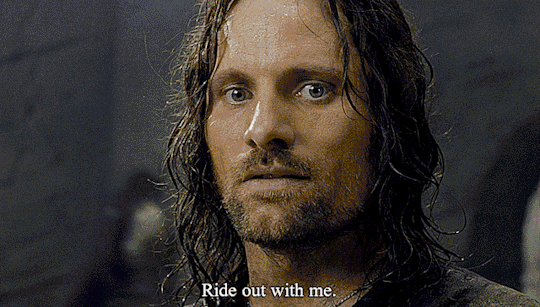
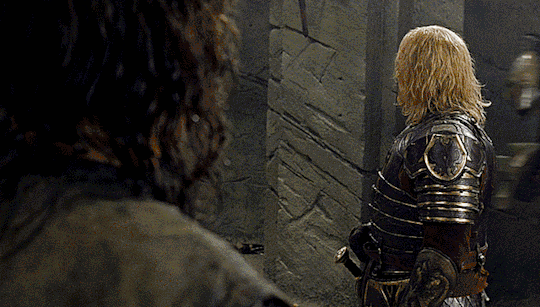

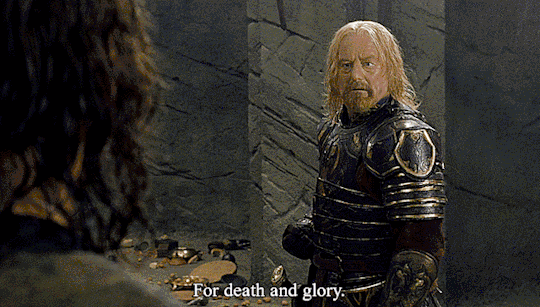
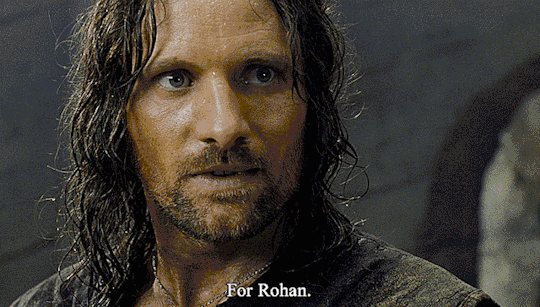

Favorite Aragorn scenes in The Two Towers as voted by my tumblr poll
2 nd place: Ride out with me 4k
#lotr#lord of the rings#aragorn#lotredit#theoden#4k#theoden king#king theoden#bernard hill#viggo mortensen#the two towers#two towers#God this scene is the ultimate motivation speech#aragorn got a sweaty forehead here you can see the drops in 4k
495 notes
·
View notes
Text
You think you can hurt me? I have unhealthy parasocial relationships with THEM:
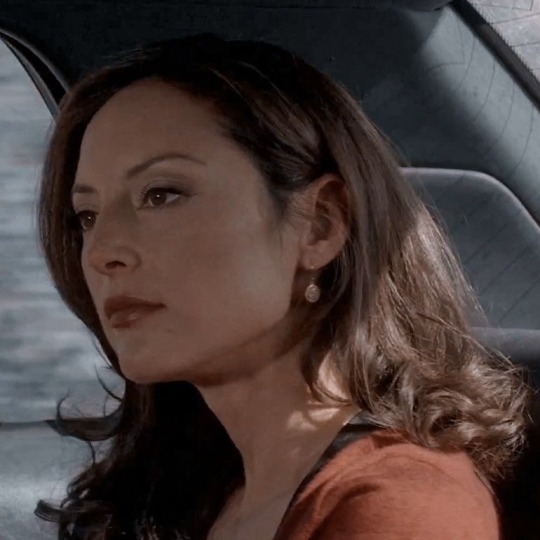


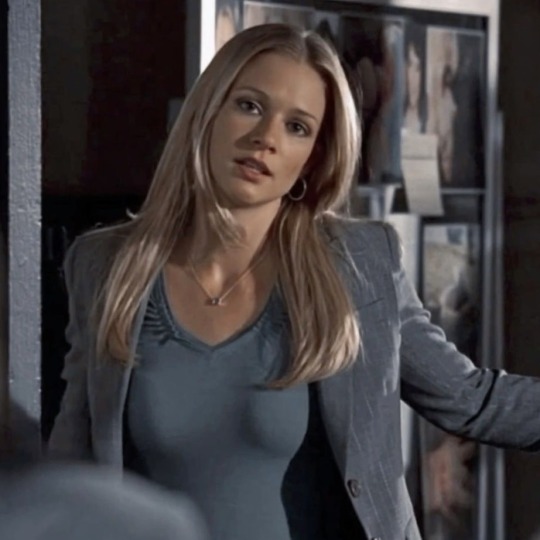


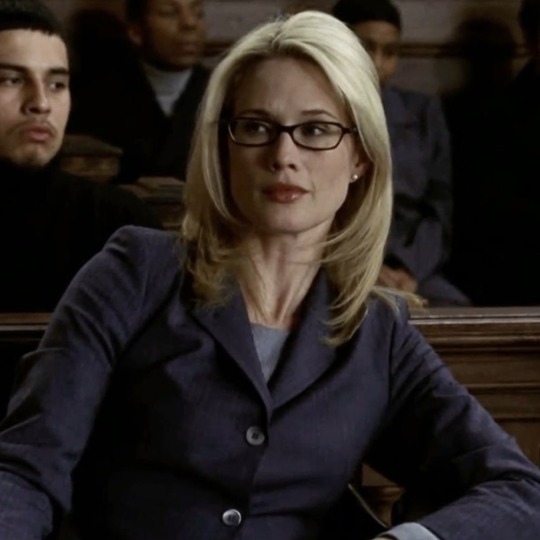

You cannot hurt me more than I have already hurt myself.
#this would be the ultimate crossover#the pain of loving fictional characters#I would drop to my knees and BARK if they asked me to#elle greenaway#addison montgomery#olivia benson#jennifer jareau#emily prentiss#christina yang#alexandra cabot#alex cabot#tara lewis#criminal minds#greys anatomy#law and order special victims unit#svu#law and order svu#l&o svu#jemily#criminal minds memes#parasocial relationships#grey's anatomy
547 notes
·
View notes
Text
Tim: Okay, so I would identify as Bisexual. Bruce: And that means you would have a male partner. Tim: Yup. Bruce: Or a female partner. Tim: Exactly. Bruce: So, that means if you don't find a partner, you're on standbi? Tim: ... Tim: Did you just-
#bruce pulling the ultimate dad move by dropping dad jokes at inappropriate times#tim is actually not that upset by it but he can't admit to finding the pun funny because then bruce and his shitty humor wins#incorrect quotes#incorrect dcu quotes#incorrect batman quotes#dcu#bruce wayne#batman#tim drake#red robin dc
185 notes
·
View notes
Text

Dc au- Amy’s ‘first’ meeting with Shadow (if not for the sake of keeping her cover and not revealing she’s batgirl she would’ve punted this guy)
here’s the context!! (its all in the tags!)
also! don’t tag as ship!
Amy is trying so hard to be civil cuz not only is she trying not to get murdered and to keep her cover, but Shadow’s also Sonic’s boyfriend and she really doesn’t wanna ruin this opportunity to hang out with him again so she’s just gonna have to reign in her anger a lot
Villain life is so mean to her 😢
But dw she does talk Knuckles’s ear off about all her frustrations during the daily check ins dfctfidtixrz
Shadow thinks she’s sus
#as soon as she can drop her cover dhe is going to Get him#art#drawing#sonic the hedgehog#sonic#sth#doodles#sonic fandom#sonic fanart#digital art#sonic the hedgehog fanart#sonic au#sth au#sth art#digital aritst#sonadow harlivy au#sth fanart#amy rose sth#amy sth#sth amy#amy sonic the hedgehog#amy rose fanart#amy rose#shadow the hedghog fanart#shadow the ultimate lifeform#shadow the hedgehog#shadow fanart#shadow sonic
604 notes
·
View notes
Text

Communications
#art#artists on tumblr#my art#digital artists#procreate#illustration#fanart#star trek#nyota uhura#tos uhura#star trek tos#lieutenant uhura#david bowie#life on mars#the longest part of this piece. was finding appropriate lyrics.#because I wanted to keep the Bowie theme#had some really solid suggestions from friends#drops of Jupiter almost won the day#then the passenger by Iggy Pop was heavily considered#but ultimately I decided if it wasn’t going to be Bowie it’d need to be from a similar era#but then I remembered life on mars exists#the most influential and incredible character in history#calling it now#Nichelle Nichols broke every stereotype#every prejudice#fucking amazing woman#RIP the lieutenant#this is a very long tag list#a lot went into this piece#it was drawn in like. 2 days. but a LOT went into this
263 notes
·
View notes
Text

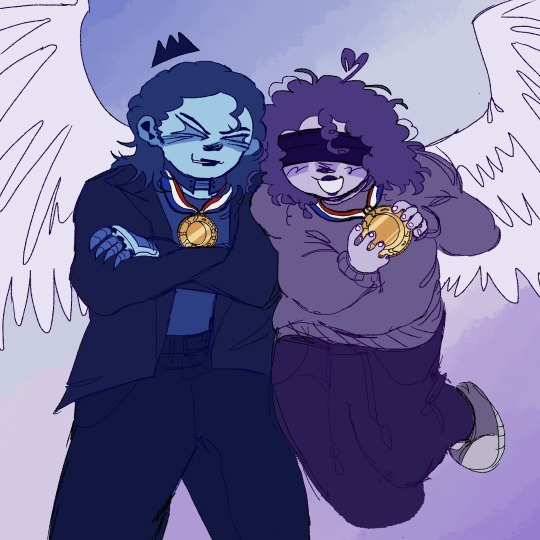
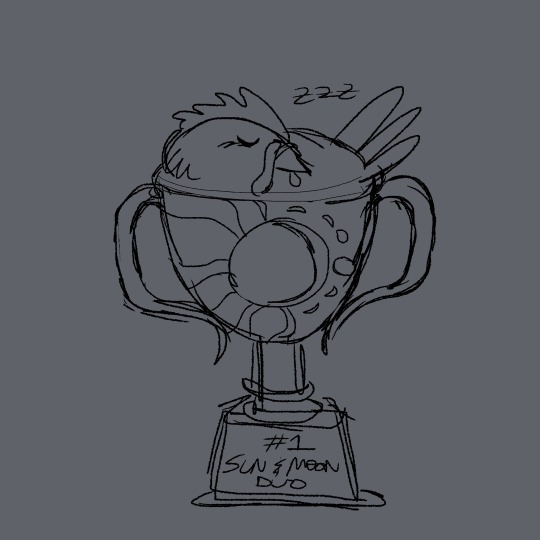
RESIDENTS HEART AND MIND STOPPED TRYING TO KILL EACH OTHER FOR FIVE SECONDS TO PULL OFF THE BIGGEST DUB OF 2024 LETS FUCKING GOOOOOOO
#new lore for hit chonny jash song ‘we’re gonna win’ dropped🔥🔥#the tournament was a reference all along can yall believe it#ALL IS CHONNY ALL IS JASH THE DAY WE FORGET IS THE DAY WE CRASH🗣️🗣️‼️‼️#YOU WERE HERE🫵🔥‼️‼️#chonny jash#chonnys charming chaos compendium#cccc#cj mind#cj heart#cj darrell#hms#chonny jash fanart#sun and moon duo tournament#I STOPPED WORKING ON A FINAL FOR THIS JUST SO YALL KNOW#BUT IDC IM SO HAPPY CONGRATS TO THEM THEYRE THE ULTIMATE SUN AND MOON DUO YEAHHHH#jaggy posts#jaggy art#chonny jash tournament
717 notes
·
View notes
Text
Why The Ending Sucks
Ok I figured it out. Hear me out:
The entire comic has a running theme best summed up as "who is controlling the narrative, and why are we listening to them?"
Hussie plays a caricaturized version of himself that he describes as "buffoonish" and "oafish". Caricature!Hussie is well-meaning, but a dumb idiot who's incredibly biased in favor of certain characters and in disfavor of others (the most obvious example being his "love" of Vriska, but there's also the way he constantly disparages Eridan). As a result, you have to be VERY SKEPTICAL and VERY CAREFUL when approaching Homestuck's narration, because even when the "best" narrator is at the helm, he's not 100% trustworthy and incapable of giving the readers an unbiased view of the story.
I say "best" because, importantly, Hussie isn't the story's only narrator. He and Doc Scratch explicitly fight over control of the story - Doc Scratch, the child abusing predator who engineered Alternia's fascist murder society, whose shaping of its history is explicitly described by character!Hussie as "fanfic". He is then killed by Lord English, who is described by Hussie as embodying the "toxically masculine" and by extension, the patriarchy, and Caliborn explicitly takes control of the story. John even grapples with Caliborn's version of events, calling out how sexist and misogynistic and shitty it is.
So if we're keeping score: control over the narrative is LITERALLY wrested away from Hussie (who was already struggling to be unbiased) by fascists, abusers, and the patriarchy. It's stressed multiple times that Caliborn/LE are responsible for literally everything that ever happens; the reason the Game Over timeline ends the way that it does is because the alpha timeline is, in essence, the narrative LE is telling: the forces of fascism get to claim the new universe, thereby propogating itself, while friendship dies and all hope is lost.
Who's in control of the narrative, and why are we listening to them?
There are other minor examples of this, too: Aranea is an exposition fairy, and she's biased as fuck and wrong ALL THE TIME about her own teammates. Karkat's explanations and rationalizations are constantly tinged with his own self-loathing and self-blame. Sollux and Meulin are both prophets as per their Mage class, but are both so bogged down by their own emotional issues that the futures they pick out are actively harmful. So on and so on. At nearly every turn, you have to interrogate who's telling the story, what their motivations are, and what they're overlooking or deliberately obfuscating.
So given that this theme is so prevalent, and so thoroughly weighted toward "well, actually, maybe you shouldn't take narration at face value and should interrogate it and come to your own conclusions," it would be Really Weird for the story to go "actually, you can totally trust the narrative now because everyone gets a happy ending".
So, I know that it makes me sound like a conspiracy theorist, but here's my genuine take on Homestuck's ending:
The ending is shitty on purpose because the viewer is intended to take it as a dare to refute the narration and make something better.
Why are we letting character!Hussie tell the story? He's a biased idiot. Why are we letting the various avatars of LE and Caliborn tell the story? They're fascist, misogynistic, predatory assholes.
And - because Homestuck is a story about life - why are we letting idiots, assholes, abusers, and creeps dictate the story of real life? The world is full of forces that would try to take control of the story and make everyone else play along, represented in microcosm within the text of Homestuck. We cannot let those forces win.
So please go out and do something kind and hopeful and loving in the world today. Thanks for reading.
#homestuck#homestuck lore#homestuck analysis#anyway i know that this sounds Crazy but hear me out#Hussie does not drop the act in the book commentaries#which were written after the comic ended#moreover the ending and epilogues are chock full of stuff that really seems designed to piss off as many people as possible#like vriska coming back but having her character development reverted#which upset both vriska haters AND vriska fans#and famously the existence of Yiffany which lowkey fucks up rosemary#but the baffling thing is that in spite of these 'lets make everyone unhappy' moves#we're still getting vital exposition about how the world works (ultimate selfhood) and characters outright saying things like#it confused me for the longest time but looking at this running theme it makes sense#the ending of homestuck is the ending picked out by terezi... who never finished her arc#it's why even though it's LITERALLY the ending she picked out for herself and her friends#shes still unable to be happy in it or feel 'fixed'#because she too is unreliable!!! she can't do it alone!!!!#and bringing back vriska eased her guilt but didnt solve her fundamental issues...#because homestuck kinda can't have a happy ending unless EVERYONE IS THERE
200 notes
·
View notes
Text

i wanna listen to the songs you listen to 🎶
#my art#yukamitsu#persona 3#mitsuru kirijo#yukari takeba#i haven't been posting my art to tumlr#but i gotta post this one here too because its tumblr special#they're sharing earphones because they're GAY#the 2000s ultimate romance activity#wake up babe new nyamcattt yukamitsu just dropped
391 notes
·
View notes
Text

Animated doodle :333 Meant to post this earlier but I’m a little late, happy (slightly belated by 5 minutes) birthday, Shadow!!
Edit: I literally don’t know how to fix the quality,, it plummeted as soon as I posted it and it was fine beforehand. This looks much better on a phone screen.
#artists on tumblr#sonic the hedgehog#sth#my art#sth fanart#sonic the hedghog fanart#shadow the hedgehog#shadow fanart#shadow the ultimate lifeform#happy birthday#to my favorite son#UTHGHGHH THE STUPID QUALITY DROP IS SERIOUSLY PMO AUGH
78 notes
·
View notes
Text
It annoys me when people have blanket expectations about all bllk ships. As if they’re not uniquely different and separate narratives. You can’t place the same expectations on bachisagi and reonagi for example cause they are different ships with different characters. They may have similarities, but isagi & bachira and reo & nagi don’t have the same priorities, beliefs, personalities etc.
I often find people don’t understand that bachisagi’s number one priority will always be soccer, even over each other. They will never settle or slow down until they are fulfilled with soccer. Choosing love/each other over soccer is not only a betrayal to their own selves (and their characters) but they’re kinda betraying each other. I’m not saying they can’t have soccer and love but if push comes to shove, soccer will always win and that’s what drew them to each other. The fact they’re soccer freaks is such a big part of their relationship and expecting either of them to tone that down for the other would probably hurt more than defeat.
Let’s say in the future they have to face off and the result of losing is not being able to play in the world cup. They wouldn’t hold it against each other nor do I think it would ruin their relationship. But going easy on the other? Or purposely losing? Now that would hurt. You could argue that other characters giving up soccer could be a positive but for isagi and bachira, the idea of prioritising each other over soccer cannot be construed in any positive way.
#bllk#blue lock#isagi yoichi#bachira meguru#bachisagi#more in the tags cause I can’t stop talking vvv#it’s interesting how in other media character a giving up something they love for character b can be seen as a huge declaration of love#like ‘you are more important to me than anything else’#but for bachisagi that is the definition of betrayal#bachira giving up his chance at playing in the world cup for isagi is possibly the worst possible ending for his character#and vice versa for isagi it would be so incongruent with his character I would drop the manga immediately#‘your worst sin is that you have destroyed and betrayed yourself for nothing’ type shit#not only have you lost your dream you’ve lost the love of your life as well#granted theres not many cases where I think a character giving up something for love is a positive thing#but that could be the aromanticism talking#but specifically for bachisagi it’s comparable to a betrayal#a lot of ships I think could survive but that’s like dropping a nuke on bachisagi’s relationship#isagi#bachira#oh yeah I specially mentioned reonagi cause I’ve seen a lot of people suggest ‘I’d give up soccer for you’ is like the ultimate#declaration of love but that shit does not work with bachisagi#imo
71 notes
·
View notes